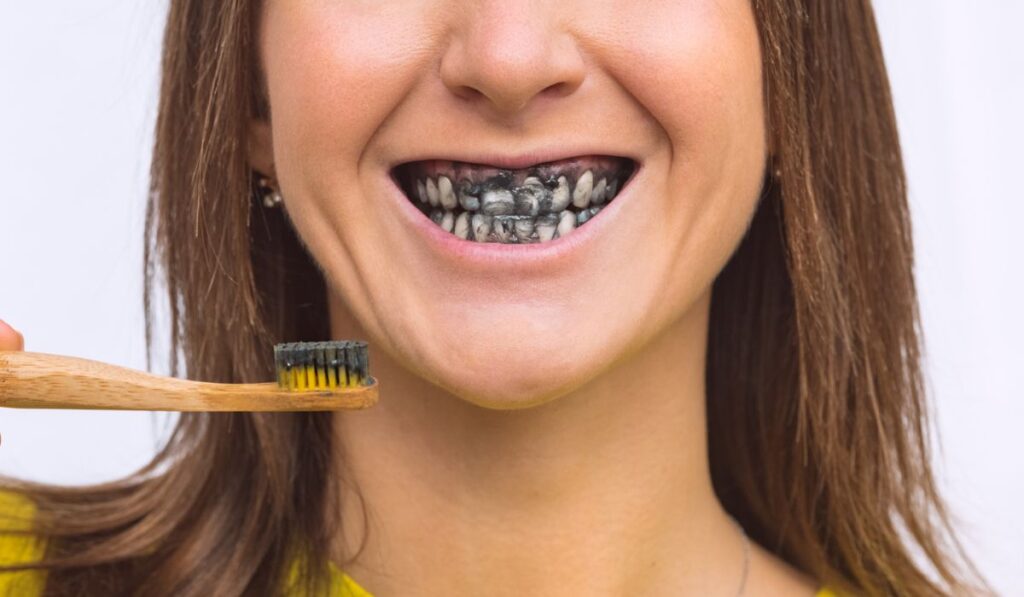The use of charcoal toothpaste has been a major trend over the years thanks to claims that it holds miraculous teeth-whitening powers. But charcoal toothpaste isn’t all it’s hyped up to be. There are some downsides to using charcoal toothpaste, including its potential to cause tooth sensitivity.
Charcoal toothpaste may cause tooth sensitivity when used frequently, especially in those with underlying conditions like gum recession, tooth decay, and worn-out fillings. The abrasive nature of charcoal toothpaste makes it hard on the enamel, and it can cause wear to the tooth structure.
Let’s take a closer look at how charcoal toothpaste works and the possible implications of using it on a regular basis.
What Is Charcoal Toothpaste?

Charcoal toothpaste (on Amazon) is generally any kind of special toothpaste with activated charcoal as a key ingredient. It’s called “activated” because the charcoal is enriched with oxygen at very high temperatures to make it porous.
This process makes it suitable for attracting and absorbing tiny food particles from the teeth and gums.
While it may seem to be a modern trend, the use of charcoal toothpaste to brighten teeth is actually an age-old concept, dating back to ancient Roman times.
Activated charcoal also comes in handy in cosmetics and medicine. For example, it’s used in anti-blackhead face creams and for treating overdoses and poisoning.
When used in toothpaste, activated charcoal gives the toothpaste an abrasive property. Most people believe this is good for scrubbing off the tough stains on teeth, thereby whitening them.
However, dentists have been hesitant to recommend charcoal toothpaste because there’s little scientific proof of its effectiveness. As it turns out, the use of charcoal toothpaste and other related teeth brightening methods can take a significant toll on your dental health, as well as cause other negative side effects.
Causes of Tooth Sensitivity
You’re more likely to experience tooth sensitivity if you have thinner tooth enamel. The enamel is the white, hard outer cover that protects the delicate inner tooth structures.
The tooth enamel can wear down and lead to sensitivity if you:
- Brushing too vigorously
- Using a hard toothbrush
- Regularly consume acidic beverages and foods
- Grinding your teeth at night
- Have receding gums from not brushing them well
- Have tooth decay, broken or chipped teeth, worn-out fillings, or crowns that leave the dentin exposed
Conditions like gastroesophageal reflux disease (GERD), bulimia, and gastroparesis may also lead to tooth sensitivity. They cause acid to come from the stomach, up the food pipe, and into your mouth, which wears down the enamel over time.
You can also experience temporary sensitivity after dental work like teeth bleaching, getting fillings, and crowns.
Can Charcoal Toothpaste Cause Tooth Sensitivity?
The scrubbing effect of charcoal toothpaste can cause tooth sensitivity because it wears down the tooth enamel in the long run.
Although you might assume that charcoal toothpaste removes stains from teeth using chemical means, it actually does so by mechanical means. What that means is that it’s only effective on surface stains.
The abrasive nature of activated charcoal makes it wear down the tooth enamel, especially if you use it every day. This exposes the soft, delicate tissue called dentin, thereby increasing tooth sensitivity.
How to Use Charcoal Toothpaste Properly
The proper way to use charcoal toothpaste is by limiting the intervals at which you brush your teeth with it — and brushing gently when you do use it. Dentists affirm that the best way to use charcoal toothpaste is by doing the following:
- Consult your dentist to know if you have underlying conditions that make charcoal toothpaste unsuitable for you.
- Brush only once a week with charcoal toothpaste if you must.
- Use a toothbrush with soft bristles (on Amazon) when using charcoal toothpaste.
- Immediately stop using charcoal toothpaste if it makes your teeth feel more sensitive.
- Don’t stick with charcoal toothpaste for long if the results aren’t as expected.
How to Prevent Tooth Sensitivity

Here are some practical ways to prevent tooth sensitivity:
- Visit a dentist for regular checkups and cleanings.
- Use only toothpaste that’s been approved by the American Dental Association (ADA), such as Colgate Cavity Protection Toothpaste (on Amazon).
- Use gentle toothbrushes that won’t scour off your enamel.
- Stick to teeth whitening methods approved by your dentist, such as in-office whitening sessions.
- Avoid eating or drinking foods that are very hot or cold.
You should also be sure to get treatment for any underlying conditions that may lead to tooth sensitivity. Your physician will put you on acid reducers for stomach conditions like GERD.
Brush gently and maintain good oral hygiene to reduce gum recession, which otherwise can lead to tooth sensitivity. Your dentist could also recommend a gum graft if you have a severe gum recession.
If you clench or grind your teeth, consider seeing a dentist and having a night guard made — grinding may also be a sign of sleep apnea and should be discussed with your dentist.
It’s also best to avoid stress and high-caffeine drinks before bed, if possible.
Perhaps most importantly, it’s crucial that you visit your dentist regularly for checkups and cleanings. They can advise you on any and all dental health-related issues you may have.


